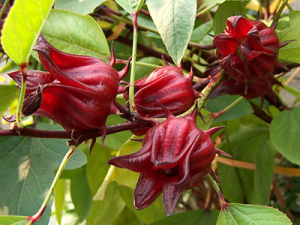
You might have seen this plant around Florida, but have you ever had a fresh Roselle flower in your tea? Whether it’s hot or cold, you can enjoy your favorite plant in your favorite drink!
Roselle Origins and Facts
Although originally from parts of Africa, Roselle is a popular plant in Florida and even in the Caribbean. In fact, in the Caribbean, hibiscus is used as a special Christmas drink. It also does well in climates like India. Roselle is usually planted around August in Florida, and it appreciates well-drained soil and water during droughts. Around October and November, the calyces (the flowers) are nice and plump and are perfect for picking. (1)
Roselle Tea
Ingredients
- 2 cups Fresh Roselle Flowers (calyces)
- 8 cups Water
- 1/4 cup Honey (optional)
- 3 tablespoons Fresh Lime Juice
Instructions
- Remove the green part at the base of the flower where the stem is attached.
- Place flowers and water in a pot and bring the pot to a boil. Once boiling turn off the stove and cover the pot, then you may also throw in other herbs like basil, mint, lemon balm, and rosemary.
- Let the tea steep for 15-20 minutes. Mix in the honey (optional) and lime juice until thoroughly mixed. Strain the tea to remove the solids. The remaining liquid is the tea.
- You can serve hot or you can stick in the refrigerator for a couple of hours, and serve it cold.
Benefits of Roselle Tea
Roselle has been used as a mild laxative, a diuretic to help with urination, and as a treatment for cracked skin, sores, and sore throat. The tea provides high amounts of the following vitamins and minerals (2):
- Carotene
- Riboflavin
- Anthocyanins
- Niacin
- Calcium
- Iron
- Vitamin C
References
- https://gardeningsolutions.ifas.ufl.edu/plants/edibles/vegetables/roselle.html
- https://medcraveonline.com/JNHFE/nutritional-and-health-importance-of-hibiscus-sabdariffa-a-review-and-indication-for-research-needsnbsp.html
- https://myfoodstory.com/hibiscus-tea-recipe/
This blog was written by Family and Consumer Sciences Intern, Mr. Caleb Dowdy, under the supervision of Family and Consumer Sciences Extension Agent, Andrea Nikolai, MPH, RDN, LDN.
 2
2
